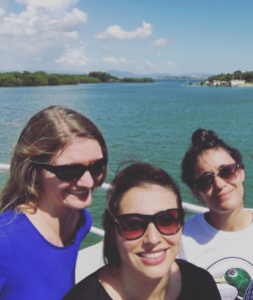Nomination
I am a third-year law student at Indiana University McKinney School of Law, and have participated in the law school’s Military Commission Observation Project (MCOP) as an NGO Observer since October 2016. The MCOP is part of the law school’s Program in International Human Rights Law.
I was confirmed by the Pentagon to attend, observe, be observed, analyze, critique, and report on military commission hearings at the Guantanamo Bay Naval Base (GTMO) in the case against Khalid Sheikh Mohammed (KSM) and four other alleged masterminds of the 9/11 attacks (the “9/11 case”). The hearings are scheduled to occur from 28 April through 5 May 2018.

Meeting fellow NGO observers in Gtmo during my last observation, October 2017.
This will be my fourth military commission observation. My first observation was at Ft. Meade, Maryland, where I observed hearings in the 9/11 case via CCTV in October 2016. My second observation was in January 2017 at Guantanamo Bay, Cuba, where I observed hearings in the case against Hadi al Iraqi / Nashwan al Tamir, an alleged high-ranking member of al Qaeda. My third observation took me back to Guantanamo Bay where I attended the 9/11 hearings in October 2017.
Background and Interest in Observing
I became interested in the MCOP during the fall of my second year of law school after hearing about the program and other students’ experiences in observing the hearings. Stemming from my interest in human rights, I applied to participate in the MCOP observations.

Touristing in a bell tower while working with refugees at an NGO in Prague.
In the summer of 2017, I worked in Lisbon, Portugal and Prague, Czech Republic at non-governmental organizations (NGOs) through the Program in International Human Rights Law (PIHRL), which is the program that administers the MCOP. During my time in Prague, I had the incredible experience of working with people seeking asylum in Czech Republic.
The PIHRL recently celebrated 20 years of successful internship placements around the world. I was also a research assistant to the program director of PIHRL in the fall of 2017. This coming fall, I will be working abroad in an area of international human rights law.
Preparing to Observe
Even though my observation is a few weeks away, I am preparing now so that I am fully informed and updated on the hearings. I am paying careful attention to a document developed and written by MCOP participants titled What Human Rights Non-Governmental Organization (NGO) Observers and Others May Want to Know Before Traveling to Guantanamo Bay, Cuba. This document, of which Professor George Edwards is the principal author, provides all of the information necessary to successfully prepare for and complete a mission to Guantanamo. Without this guide, preparing for my mission would not be complete, even though I have traveled to Ft. Meade and Guantanamo in the past. It is a resource that is full of information not only for the first-time participant, but also for the seasoned observer.
I have also been keeping up-to-date on the hearings and goings on at Guantanamo by following the Miami Herald online, as journalist Carol Rosenberg keeps close watch on the proceedings and reports on the hearings and beyond. I have also found Twitter to be instrumental in keeping informed about the hearings.
I will soon begin to prepare my travel arrangements to Andrews Air Force Base in Maryland, where I will depart to Guantanamo Bay.
NGO Coins
The MCOP has developed a special coin for distribution. I will have a few coins available during this observation.

Sheila Willard (J.D. Candidate, ’18)
NGO Monitor, U.S. Military Commission Observation Project (MCOP)
Program in International Human Rights Law
Indiana University McKinney School of Law
Like this:
Like Loading...





